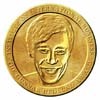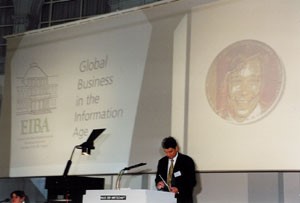by Lars Håkanson, Örjan Sölvell and Udo Zander

Creation of the Award
The “Gunnar Hedlund Award” was launched in 1997, at the 23d Annual Conference of EIBA in Stuttgart. Earlier that year, Professor Gunnar Hedlund, of the Stockholm School of Economics (SSE) – a renowned IB scholar and a long-time active supporter of EIBA – had passed away at a much too early age.
Gunnar had studied at SSE, where he received his PhD in 1976, at the age of 27. In 1975, a new institute had been formed there, the Institute of International Business (IIB), initiated and funded through an endowment by the leading Swedish industrialists Ruben Rausing, founder of Tetra Pak, and the two brothers Marcus and Jacob Wallenberg of SEB. Gunnar was involved with the institute since its inception, and in 1980 he became its Director, a position he held until shortly before his death. He always took an active role in developing SSE. Among other things, he actively participated in creating two other important institutes at SSE: the European Institute of Japanese Studies (EIJS) and the Centre for Advanced Studies in Leadership (CASL).
Gunnar was an old-fashioned academic scholar, of a kind that has all but vanished in present-day, managerially governed universities. He found the time to read widely, also outside his own disciplines, and was not much interested in publication and prestigious journals; Gunnar valued novel ideas and high-quality research for their own sake. Only with delay were the demanding standards he set for the institute reflected in its publication record.
Gunnar published several important books and articles in the areas of international business and organization theory. His two most noted works, “The Hypermodern MNC – A Heterarchy?” in Human Resource Management (1986), and “A Model of Knowledge Management and the N-Form Corporation” in Strategic Management Journal (1994), are still widely cited and are classic readings within organization studies and international business. However, Gunnar Hedlund’s recognition, standing and influence, both in international business and beyond, were not primarily based on his publication record but on his personality and the force of his intellect.
In 1997, the boards of IIB and the European International Business Academy (EIBA), jointly decided to launch an international award for the best PhD dissertation in the field of international business – the “Gunnar Hedlund Award” – with a substantial prize sum, today amounting to €10,000. The mission of the award is to stimulate and reward high quality, creative scholarly work by PhD candidates around the world, and to commemorate Gunnar’s important work in the field. The first prize was awarded in Jerusalem in 1998.

Launching of the Gunnar Hedlund Award by Prof Örjan Sölvell at EIBA in Stuttgart, December 16 1997
The winner of the Award is announced at the Annual Meeting in December each year. Three to four finalists are asked to present their work at the conference, and the prize is awarded to the work that, in the opinion of the jury of distinguished professors, has the greatest potential to impact the field of international business in the future. In line with Gunnar’s spirit, both theoretical and empirical contributions are honored, and creativity and originality is emphasized. The process of selecting the winner is as follows: First, applicants submit their theses and 10-page blinded summaries. Based on the blinded summaries, members of the SSE faculty shortlist 3-4 finalists. The jury decides on the winner, based on the full open PhD theses of the finalists.
Table 1 The Gunnar Hedlund Jury
Örjan Sölvell, Chair (1997-2016)
Udo Zander, Chair (2016-)
Julian Birkinshaw (2000-)
Peter Buckley (2004-)
Eleanor Westney (2006-)
Rebecca Piekkari (2009-)
Kazuhiro Asakawa (2018-)
Daniel van den Bulcke (1997-2007)
Don Lessard (1997-2005)
John Dunning (1997-2003)
Nakiye Boicacigiller (1997-1999)
Since the inception of the award, several hundred PhDs from a large number of universities throughout the world have submitted their dissertations. The most frequently occurring themes include FDI and foreign market entry, headquarter – subsidiary organization and control, and SME internationalization and born globals. To date, 15 PhDs have been awarded the prize, including the medal and diploma (Table 2).
Table 2 Past Winners of the Gunnar Hedlund Award
1998 Anthony S. Frost Sloan School, MIT
1999 Jaeyong Song Wharton School
2000 Michelle Gittelman Wharton School
2001 Marian Beise Technische Universität Berlin
2002 Joseph Kogan Harvard University
2003 Simon Harris University of Leeds
2004/2005 Renata Kosova University of Michigan
2006 Jon Erland Lervik BI Oslo
2007 Chris Changwha Chung Ivey, Western Ontario
2008/2009 Jesper Edman Stockholm School of Economics
2010/2011 Lisa Gärber WU Vienna
2012/2014 Karl Joachim Breunig BI Oslo
2014/2016 Jacqueline Mees-Buss University of Sydney
Carlos Rodriguez McGill University
2016/2018 Yamlaksira Getachew Loyola Marymount University